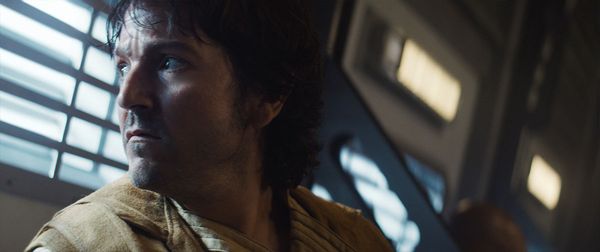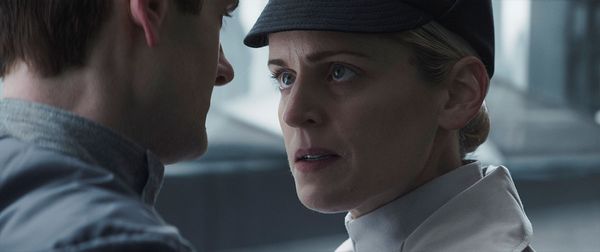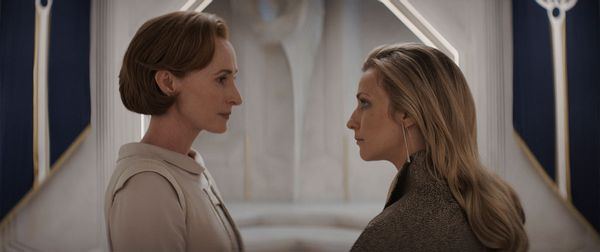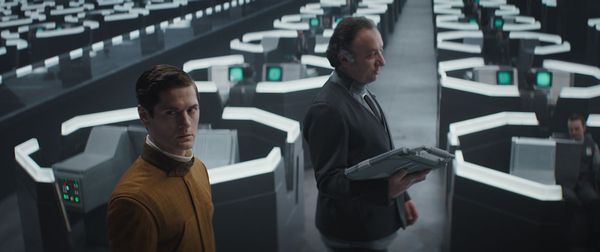
There are enough stories about the wrongfully convicted to make the circumstances that land the titular hero of "Andor" in prison seem entirely plausible.
In the drama's seventh episode, "Announcement," Diego Luna's Cassian Andor is hiding out beachside in a place called Niamo. He has money, romantic companionship and an appropriately low profile under the alias Keef Girgo.
None of that matters when he's walking to the store to pick up some snacks and happens to be nearby when a group of other men runs by him in an attempt to outrun some local stormtroopers. Cassian thinks he's keeping his cool, but his decision to dash up a staircase is his undoing. A trooper detains him, accusing him of being "part of it" without saying what "it" is.
Next thing you know he's in front of a local magistrate sentencing him to six years imprisonment. She doesn't care about his claims that he's just a tourist. Take it up with the Emperor, she says, knowing that's impossible.
Cassian looks and dresses like an unimportant local, someone who can vanish without consequence. Eventually, that will make him a great spy. At present, he's disappeared to Narkina 5, a factory facility in the middle of some unknown sea, where inmates are kept barefoot and disciplined through a reward and punishment system.
Prisoners are divided into groups and spend their days assembling mechanical parts used for unspecified purposes. Those who misbehave are shocked with crippling current delivered through the floorboards. The most productive groups are rewarded with flavored nutritional paste. The least productive is shocked to the point of collapse. Without any legal representation or hope for appeal, the prisoners endure their lot, trusting they'll be released that when they've completed their sentence.
But between the threat of a nascent rebellion and the Imperial bureaucracy's determination to expand, prison slave labor is an economically sound solution to growing the manufacturing workforce needed to create the war machines necessary to bring the galaxy to heel.

Cassian doesn't quite get this at first, but he picks it up soon enough when another inmate warns him to keep his head down and work, and ignore the count of the days remaining on his sentence. "Anyone who thinks they're getting out of here now is dreaming," he says. "Those days are over."
"Andor" follows the slow burn progression of a serious TV drama as opposed to the industrial light and magic dominating other "Star Wars" shows.
"Andor," another offshoot of Disney's steadily expanding "Star Wars" galaxy, is the least space operatic title in the franchise's library next to "Rogue One." No one in this show prays to the Force, knowing that every inch of liberation that can be gained only results from extensive planning, risk, sacrifice and luck.
As of now, Cassian is no rebel. The man we're getting to know remains a mercenary, albeit one with principles, doing whatever he can to survive. Occasionally that has meant shooting first when it looks like someone might betray him but, unlike other shows and movies, there's no need to explain why.
"Andor" follows the slow burn progression of a serious TV drama as opposed to the industrial light and magic and familiar characters dominating other "Star Wars" shows. Because of this some longtime "Star Wars" followers complain about this drama's unhurried approach compared to other action-forward tales in the franchise's stable such as "The Mandalorian."
But if the goal is to make a persuasive case for the humanity of these characters and explain the chilly inhumanity of the people who side with the Empire, leisurely precision is what a story like this requires. Explaining how and why people like Cassian Andor, are driven to rise against an oppressive system requires a steady ratcheting-up of tension via an array of insults.
In this way it does a better job of explaining how the Empire becomes the sprawling, all-ensnaring force that we know it to be, and why some humans – and it is mostly humans, you'll notice – intentionally profit from its destructive aims. Showing others pay the price up close also negates the bloodlessness taken for granted in other "Star Wars" chapters.

Indeed, the cold reduction of lives into units only makes the Empire more chilling, along with tacitly inviting us to consider our society's embrace of corporate dominance. When Imperial Security Bureau head officer Major Partagaz (Anton Lesser) engages a subordinate in sanitized corporate speak about resistance to a hostile Imperial invasion of a planet, the exchange might as well be taking place at any team meeting in any major office building.
"The dimensions of the conflict have diminished sufficiently that mining has resumed on the occupied land," the man says, which Partagaz responds to by asking him about "storage issues with the displaced." This occurs a few episodes before Cassian finds himself in the wrong place at the wrong time and is whisked off to Narkina 5, one of those "storage issue" solutions.
Anyone who claims not to understand the concept of the poverty-to-prison pipeline or disbelieves the word of the wrongfully convicted cannot watch this show and still legitimately hold on to that illusion. It isn't as if series creator Tony Gilroy and Beau Willimon, the former "House of Cards" showrunner who wrote the three-episode Narkina 5 arc, pulled the idea of Cassian's plight out of thin air. Prison labor and exploitation is a frequent part of the supply chain that brings us many first-world conveniences.

But Willimon also uses Cassian's prison stay to delineate the lines more starkly between classes in this society even as he connects them, and not simply via the elegant Coruscant parties hosted by Mon Mothma (Genevieve O'Reilly). She also has a past and a path that led to the Rebel Alliance, and O'Reilly's steeled calm adds welcome layers to a character mainly known in the broader "Star Wars" legend for delivering a short speech and wearing the hell out of a flowy gown.
Still, as a Senator, we've seen her type before. What we haven't seen, and appreciated, are the nameless schemers and aggressive cubicle drones who make Imperial domination possible and efficient.
Death by the repetitive execution of tedious tasks thousands of times is a true risk, and pain is an effective jailor. More than anything else, this is what should alarm us.
The Narkina facility is simply one stop on a conveyor belt that leads back to a sterile building stuffed with desk jockeys. This is where Kyle Soller's desperate striver Syril Karn tries to make his mark after Cassian gets him fired from his security officer job. But Denise Gough's Dedra Meero is a career-driven shark who could devour him whole. Dedra is determined to stand out and will chew through anyone in her way.
As one of two women seen in the Imperial Security Bureau's supervisory council room – you can't claim the Empire isn't an enthusiastic patriarchy! – her zealous quest to climb the ranks make her exacting and cruel. She cares less about who Cassian Andor is than what his capture can do for her reputation.

Whether in Imperial office space, which could be the inside of any American office building, or within the Narkina prison, which seems like an advanced version of modern incarceration facilities, death by the repetitive execution of tedious tasks thousands of times is a true risk, and pain is an effective jailor. More than anything else, this the disquieting aspect of the show should alarm us most acutely.
It takes the blithe execution of another group of Narkina prisoners, and failed effort to keep the other inmates in the dark about what happened, to finally persuade Cassian's inmate supervisor Kino Loy (Andy Serkis) to stop trusting that the system cares enough about them to live up to its promise to free them, let alone spying on their conversations.
In an earlier hour of "Andor," Partagaz warns his people that security is an illusion. Narkina proves this to be true.
The "Star Wars" mythology has been drilled into our culture since Generation X was in its infancy, sold as a comfortable fairy tale set long ago in a place far, far away assuring children that good always triumphs over evil. "Andor" pierces that fantasy by placing a tight focus on the familiar bureaucracy monotony and drudgery that eventually leads to the destruction of planets. This isn't merely the stuff of speculative fiction or space opera.
Nearly every situation we've seen is a fictionalized, heightened version of the type of corporate-sponsored environmental and political exploitation taking place somewhere on Earth, and very likely in your work life or one of someone you know. Of course, since it's part of "Star Wars" we're encouraged to embrace "Andor" as fantasy, a story told very well.
For the same reason, and especially now, we should believe in what this story is telling us, along with appreciating how effectively it wraps the cautionary message of Cassian Andor's journey inside the franchise's pageantry. Like Mon Mothma, it cuts an impressive picture of steadiness with no intention of apologizing for being up to something more dangerous . . . and honorable.
New episodes of "Andor" stream Wednesdays on Disney+.







